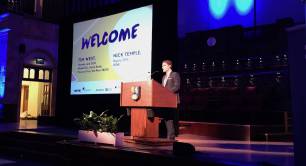It's time for social entrepreneurs to think big, Good Deals hears
It's time to think big, delegates were urged at the Good Deals 2016 conference on Tuesday morning.
This was the key theme raised by the speakers at the opening plenary of the UK's social enterprise, social innovation and social investment event which is taking place in Birmingham today.
"I really want social enterprises to embrace this idea about scale and size," said Kenny Ewan, CEO of WeFarm, an award-winning social enterprise which has 105,000 small farmers across the world using its social messaging service to share ideas about how to increase their productivity.
I'd like to see a world where planet and people matter as much as capital
He said that social entrepreneurs should "think big", pointing out that venture capitalists were looking for big ideas that were "really going to be impactful on a world level".
Susan Ralphs (pictured above, right) of the Ethical Property Company agreed, saying she looked forward to a different type of capitalism, when social investment would be mainstream, not peripheral to society. "I'd like to see a world where planet and people matter as much as capital," she said.
The speakers also focused on what was holding back social entrepreneurship.
Ralphs said: "We should shout more loudly, say how good we are – we are terribly shy."
She added that if the sector was to grow, more big investors were needed. And, as the market matured, a secondary market would be needed to give investors an exit strategy.
Cliff Prior (pictured above, centre), CEO of Big Society Capital, pointed out that the affordability of social investment was a problem. "That drains and holds back progress," he said.
What's more, said Social Investment Business CEO Jonathan Jenkins, social investors were not taking as much risk as they needed to, which was connected with the fact that the sources of many of the funds were government and institutions.
Picking up on the concept of risk, Prior asked whose risk we were talking about. "My worry is about vulnerable beneficiaries suddenly having a loss of service because a social investment goes wrong. It's the social risk that we really need to think about, not the financial risk."
The speakers agreed that there was a lot for social entrepreneurs to do. "We have been focused on the 10% of the population who are the most disadvantaged, but what Brexit and the US election have shown is that the next 30 to 40% feel seriously left out of the future," said Prior. "We need to think more broadly."



